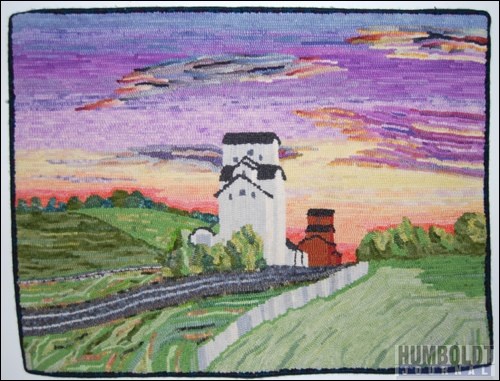They are hookers with a fetish for wool.A group of 20 or so women, united by their shared passion for traditional rug hooking, form the Heritage Rug Hookers of Saskatoon. They are part of a revitalization movement of a craft that takes its roots back to the early 1800s.From now until the end of December, visitors to the Humboldt and District Museum and Gallery can see samples of this work in the exhibit "Grain Elevators: Vanishing Prairie Landmarks."It's an unusual topic for rug hookers to depict. Rita Smith, who coordinated the exhibit and is a rug hooker as well, explains in a magazine article why they chose it. "Grain elevators are a metaphor for a way of life," she writes. "Their mystique goes far beyond their sole function, which was as a grain storage building, holding grain until it could be hauled by train to eastern and international destinations. They symbolize our agricultural heritage, which is the lifeblood of the prairies."According to Smith, the Saskatoon guild did a survey among other rug hookers in western Canada to determine the interest in hooking pictorial rugs of grain elevators. Receiving positive feedback from other guilds, they sent out a call for submissions.Now the 44 pieces that make up the exhibit are touring Saskatchewan galleries before they eventually move on to Manitoba, Alberta and B.C.At the exhibit opening in Humboldt, the ladies held a demonstration of the craft and talked about the art of rug hooking from the past to today."In its earliest years, rug hooking was a craft of poverty," Smith said. "Originally, the materials used were burlap feed bags and any worn-out clothing that wasn't fit for quilting."That, she says, included materials such as stockings, long underwear, and men's woolen trousers. Yarn was too precious, and had to be reserved for knitting and weaving. "A lot of (the old rugs) don't exist anymore because neither the backing nor the fabrics tended to last," commented rug hooker Betty Ann Baran, whose current project is a pictorial replica of an Emily Carr painting. "They don't wash well, so after a few washings, a few shakings off outside, they're gone, they're finished."Which is why, or at least one of the reasons, rug hookers today use wool, the two ladies say."It's long-lasting, and if you're going to put them on the floor and walk on them, you need that," added Smith.Projects do not always end up as floor rugs, though. They may be made into other articles, such as purses, or simply be used as a wall hanging. Smith explains that the trend today is to use wool flannel, often dyeing it themselves to achieve the colours they want before it is cut into very fine strips with a special cutting machine.As a hobby or craft, rug hooking has developed in much the same way patchwork quilting has developed. Less than a century ago, quilts and hooked rugs were made for functional use, and therefore made with whatever leftover scraps of materials were available. These days, however, it has developed into a hobby where higher-quality materials are used for quite elaborate projects. Nevertheless, the ladies say rug hooking doesn't have to be costly. It still can be made with scraps of leftover fabrics, and all you need is a frame to stretch your base fabric on, a hook, and some imagination."It's absolutely as individual as it gets," Smith said, speaking about rug hooking in general. "We like to get together and work because we're inspired by each other, and that comes out of the history, too, with quilting bees and so on."Women have always enjoyed getting together with other women," she added. "There's strength in it."




